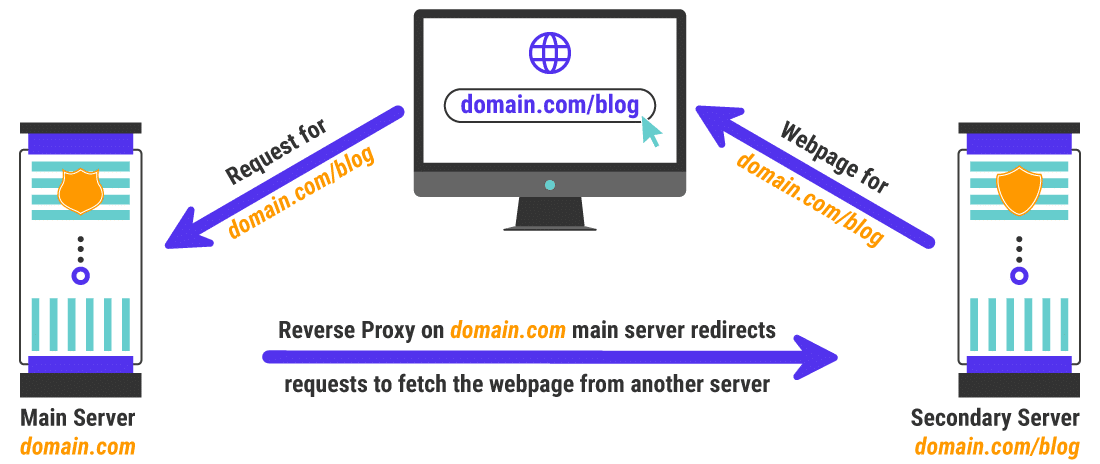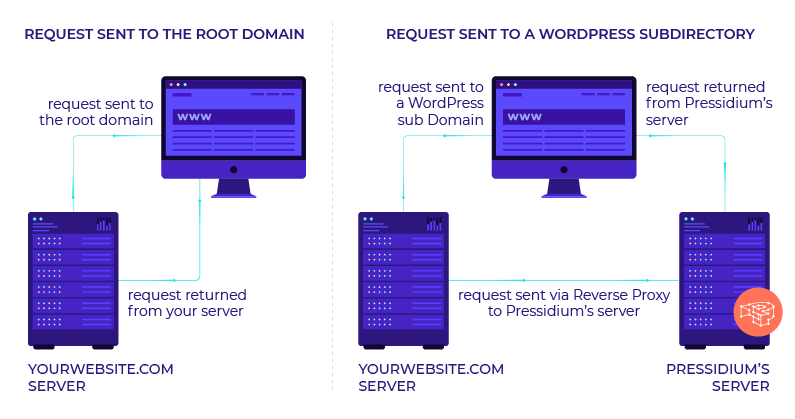Moz Q&A is closed.
After more than 13 years, and tens of thousands of questions, Moz Q&A closed on 12th December 2024. Whilst we’re not completely removing the content - many posts will still be possible to view - we have locked both new posts and new replies. More details here.
WordPress Sub-directory for SEO
-
Hi There,
I'm working on a WordPress site that includes a premium content blog with approx 900 posts.
As part of the project, those 900 posts and other membership functionality will be moved from the main site to another site built specifically for content/membership.
Ideally, we want the existing posts to remain on the root domain to avoid a loss in link juice/domain authority.
We initially began setting up a WordPress Multisite using the sub-directory option. This allows for the main site to be at www.website.com and the secondary site to be at www.website.com/secondary.
Unfortunately, the themes and plugins we need for the platform do not play nicely with WordPress Multisite, so we started seeking a new solution, and, discovered that a second instance of WordPress can be installed in a subdirectory on the server. This would give us the same subdirectory structure while bypassing WordPress Multisite and instead, having two separate single-site installs.
Do you foresee any issues with this WordPress subdirectory install? Does Google care/know these are two separate WordPress installs and do we risk losing any link juice/domain authority?
-
@himalayaninstitute said in WordPress Sub-directory for SEO:
WordPress can be installed in a subdirectory
I have done this a lot and I mean a lot what you want to do is set up a reverse proxy on your subdomain and this will allow you to not only bypass having to use multisite for subfolder but if you want to power it separately you can you do not have to it all. You should probably use your same server and power through Fastly our CloudFlare


once you set this up it is super easy to keep it running in your entire site will be much faster as a result as well
my response to someone else that needed a subfolder
https://a-moz.groupbuyseo.org/community/q/topic/69528/using-a-reverse-proxy-and-301-redirect-to-appear-sub-domain-as-sub-directory-what-are-the-seo-risksplease also look at it explained by these hosting companies is unbelievable easy to implement compared to how it looks and you can do so with Fastly or cloudflare in a matter of minutes
-
https://servebolt.com/help/article/cloudflare-workers-reverse-proxy/
-
https://support.pagely.com/hc/en-us/articles/213148558-Reverse-Proxy-Setup
-
https://wpengine.com/support/using-a-reverse-proxy-with-wp-engine/
-
https://thoughtbot.com/blog/host-your-blog-under-blog-on-your-www-domain
-
https://crate.io/blog/fastly_traffic_spike
*https://support.fastly.com/hc/en-us/community/posts/4407427792397-Set-a-request-condition-to-redirect-URL -
https://coda.io/@matt-varughese/guide-how-to-reverse-proxy-with-cloudflare-workers
-
https://www.cloudflare.com/learning/cdn/glossary/reverse-proxy/
-
https://gist.github.com/LimeCuda/18b88f7ad9cdf1dccb01b4a6bbe398a6
I hope this was of help
tom
-
-
@nmiletic The content section of the site requires a unique UI Design and other robust functionality, so having a separate theme/plugins in its own directory is going to be the way we go here. Thanks for your assistance!
-
@himalayaninstitute Have you thought about adding a page and making all of this new content a subpage? Or changing your permalink structure to include a category in the URL? You can then add all of these posts under that category and have the URL show up as www.example.com/category/page-or-post-name
-
The website at the subdirectory will be an online learning platform with a blog, online courses, memberships, gated content, etc. The content currently lives on the main site, so, it's great that we can move it into the subdirectory without taking a hit from Google.
Since these are fundamentally two separate websites, we're not concerned about needing to manage them independently.
Thanks again for your input and advice, we greatly appreciate it!
-
@amitydigital said in WordPress Sub-directory for SEO:
Google will view it as one site so you shouldn't have any issues from that perspective. The Google bot is just looking at pages and won't know/care that the underlying CMS that is running some pages is a different install than other pages. The downside is you now have two websites to maintain, two themes, two sets of files, etc... That may result in a bit of a headache in the future.
As @amitydigital put it, the issue with your approach would be repetitive tasks. You will not loose any DA nor PA (being that you implement a correct 301 redirection). What is going to be on the subdirectory?
-
Google will view it as one site so you shouldn't have any issues from that perspective. The Google bot is just looking at pages and won't know/care that the underlying CMS that is running some pages is a different install than other pages. The downside is you now have two websites to maintain, two themes, two sets of files, etc... That may result in a bit of a headache in the future.
Got a burning SEO question?
Subscribe to Moz Pro to gain full access to Q&A, answer questions, and ask your own.
Browse Questions
Explore more categories
-
Moz Tools
Chat with the community about the Moz tools.
-
SEO Tactics
Discuss the SEO process with fellow marketers
-
Community
Discuss industry events, jobs, and news!
-
Digital Marketing
Chat about tactics outside of SEO
-
Research & Trends
Dive into research and trends in the search industry.
-
Support
Connect on product support and feature requests.
Related Questions
-
Rel canonical tag from shopify page to wordpress site page
We have pages on our shopify site example - https://shop.example.com/collections/cast-aluminum-plaques/products/cast-aluminum-address-plaque That we want to put a rel canonical tag on to direct to our wordpress site page - https://www.example.com/aluminum-plaques/ We have links form the wordpress page to the shop page, and over time ahve found that google has ranked the shop pages over the wp pages, which we do not want. So we want to put rel canonical tags on the shop pages to say the wp page is the authority. I hope that makes sense, and I would appreciate your feeback and best solution. Thanks! Is that possible?
Intermediate & Advanced SEO | | shabbirmoosa0 -
Wordpress Comments Pagination
Hi Mozzers What is your view on the following. Should you Paginate comments to increase page speed? If yes, at what # of comments would you begin pagination? (with the objective being decreasing page load times) Apply rel="canonical" back to the main article URL? eg: url/comment-page-1 => url noindex the comment pages? create a "View all" comments page? Thanks in advance for your help! 🙂
Intermediate & Advanced SEO | | jeremycabral
J0 -
Does Google hate wordpress?
I have my categories pages set to noindex, follow. I deactivated the author and date based archives, and all the /page/2 /page/3 are noindex. Is this the right approach? I had thought about adding some text to the topic of each category page and then changing them to index. I'm using showing recent post excerpts on the homepage. Another other suggestions? I think two of my sites are in panda for no good reason. It seems like non-wordpress blogs in my industry do better than comparable wordpress sites.
Intermediate & Advanced SEO | | KateV0 -
De-indexed Link Directory
Howdy Guys, I'm currently working through our 4th reconsideration request and just have a couple of questions. Using Link Detox (www.linkresearchtools.com) new tool they have flagged up a 64 links that are Toxic and should be removed. After analysing them further alot / most of them are link directories that have now been de-indexed by Google. Do you think we should still ask for them to be removed or is this a pointless exercise as the links has already been removed because its been de-indexed. Would like your views on this guys.
Intermediate & Advanced SEO | | ScottBaxterWW0 -
URL Structure for Directory Site
We have a directory that we're building and we're not sure if we should try to make each page an extension of the root domain or utilize sub-directories as users narrow down their selection. What is the best practice here for maximizing your SERP authority? Choice #1 - Hyphenated Architecture (no sub-folders): State Page /state/ City Page /city-state/ Business Page /business-city-state/
Intermediate & Advanced SEO | | knowyourbank
4) Location Page /locationname-city-state/ or.... Choice #2 - Using sub-folders on drill down: State Page /state/ City Page /state/city Business Page /state/city/business/
4) Location Page /locationname-city-state/ Again, just to clarify, I need help in determining what the best methodology is for achieving the greatest SEO benefits. Just by looking it would seem that choice #1 would work better because the URL's are very clear and SEF. But, at the same time it may be less intuitive for search. I'm not sure. What do you think?0 -
Directory and Classified Submissions
Are directory submissions and Classified Submissions still a good way to create backlinks? Or they are obsolete methods and should be discontinued?
Intermediate & Advanced SEO | | KS__0